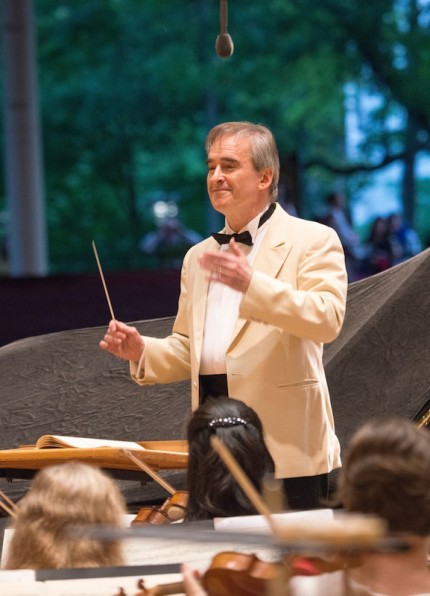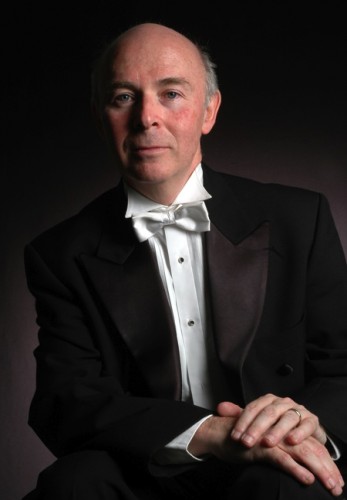Conlon, CSO and Osorio vivid and stylish in Brahms and Zemlinsky

Hans Christian Andersen’s The Little Mermaid is familiar to modern audiences– mostly through the Disney concoction and subsequent Broadway musical–but the fairy tale has received innumerable adaptations since its publication in 1837.
One such realization was Alexander Zemlinsky’s three-movement orchestral fantasy Die Seejungfrau, a work that has led a tortured existence since its debut in 1905. Big chunks of the score were considered lost until the discovery of the first movement, subsequent reconstructive surgery, and finally a belated modern premiere in 1984. Since then it has become one of the composer’s most-performed works, and few artists have labored with greater zeal to find a wider audience for it than conductor James Conlon.
Now in the final weeks of his 11-year stint as music director of the Chicago Symphony Orchestra’s Ravinia summer residency, Conlon revisited the score Wednesday night in a performance that was as vivid and idiomatic as one could hope to encounter. Few conductors can manage this dense, sprawling work without a score, and Conlon’s reliance on memory was a testament to his thorough immersion in the Austrian composer’s fevered, post Romantic vocabulary.
Ravinia’s sound re-enforcement seems to have settled into a more natural state after some annoying anomalies earlier in the summer. Conlon’s familiarity with the quirky acoustic of the amphitheater no doubt played a key role in arriving at workable balances, a feat doubly impressive considering the numerous personnel substitutions and Ravinia’s tight rehearsal schedule.
The composer’s opulent idiom tempts interpreters to imbue every morsel with frenzied yearning, but Conlon wisely curbed this temptation with an ear toward the big structural picture. Zemlinsky peppered his score with Wagner-style leitmotifs, and the conductor took care to put them clearly in the forefront but with enough variance in color to avoid ear fatigue.
Of the scores’ innumerable solo turns, Robert Chen’s sweetly seductive renderings of the Mermaid’s themes were especially alluring. Cellist Kenneth Olsen’s lyrical depiction of the Prince were appropriately seductive, as were the woodwind section’s exquisite renderings of dappled light and rippling waves.
The sprawling, programmatic score has become familiar enough to evaluate beyond its place as a curious historical novelty. If it doesn’t quite measure up to the standards of the best Richard Strauss tone poems (its closet musical kin), it is certainly worthy of the occasional revival, especially when performed in such an informed and compelling manner.
One of Zemlinsky’s early champions was Johannes Brahms, though from today’s vantage point there seems to be little in common between Die Seejungfrau and the other work on the program, the latter’s Piano Concerto No. 1. Jorge Federico Osorio was the superb pianist, and while a known quantity to Chicago audiences, his reading of the imposing repertoire standard cemented his reputation as a Brahms interpreter to be reckoned with.
While dating from a relatively early era in the composer’s output, the massive concerto seems to require the experience of a seasoned performer to fully realize its formidable expanse. Conlon and Osorio were perfectly matched for the task, choosing tempos that seemed right on the money while finding stylistic commonalities that lead to compelling conversations between soloist and orchestra.
Osorio seemed unfazed by the concerto’s demands, building blocks of massive sound without compromising inner clarity and detail. The intricate double trills in the slow movement’s cadenzas were masterfully rendered, and his subtle rubato provided a fine lyrical outline of the concerto’s formal contours. There have been flashier versions of this warhorse, but Osorio plumbed its considerable depths as well any artist on the concert circuit.
James Conlon conducts the Chicago Symphony Orchestra 7 p.m. Saturday in an all-Tchaikovsky program with violinist Maxim Vengerov. ravinia.org.
Posted in Performances






Posted Jul 30, 2015 at 3:48 pm by Anne-Marie
Amen to Mr. Osorio’s performance which was both elegant and powerful!
The Zemlinsky piece was a discovery for me — a beautiful one at that. Mr. Conlon will be missed by this concertgoer. His introductions always enhance my appreciation of the repertoire.